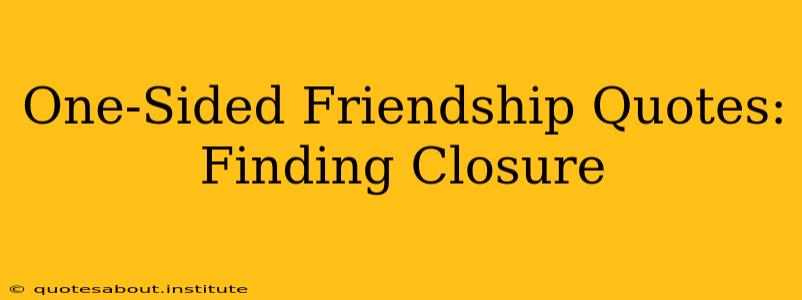Feeling like you're pouring your heart into a friendship that isn't reciprocated is incredibly painful. One-sided friendships leave you feeling unseen, unheard, and ultimately, unfulfilled. While it's natural to search for validation through quotes and affirmations, true closure comes from understanding the situation, accepting your feelings, and taking steps towards self-care and healthier relationships. This post will explore the complexities of one-sided friendships, address common questions, and offer guidance on finding closure and moving forward.
What are the signs of a one-sided friendship?
Recognizing the signs of a one-sided friendship is crucial for your well-being. These imbalances aren't always obvious, but consistent patterns reveal the truth. Look for these indicators:
- Unequal effort: Do you initiate most conversations, plans, and check-ins? Are you constantly reaching out, while your friend only responds sporadically?
- Lack of reciprocity: Do you offer support, understanding, and a listening ear, but receive little in return? Is the emotional exchange disproportionate?
- Self-centered behavior: Does the friendship primarily revolve around your friend's needs and interests, with little regard for yours? Do they consistently fail to consider your feelings or perspective?
- Superficial interactions: Does the connection feel surface-level, lacking meaningful conversations or genuine emotional intimacy?
- Feeling drained: Do you consistently feel emotionally drained or depleted after interactions with this person? This is a significant red flag.
Why do one-sided friendships happen?
Understanding why a friendship becomes one-sided can be helpful in processing your feelings and moving on. Several factors can contribute:
- Personality differences: Sometimes, fundamental personality differences lead to an imbalance in giving and receiving.
- Life circumstances: Stress, major life changes, or personal struggles can temporarily or permanently alter someone's capacity for friendship.
- Underlying issues: Unresolved personal issues or mental health struggles can impact a person's ability to maintain healthy relationships.
- Fear of intimacy: Some individuals struggle with intimacy and may unconsciously create distance in relationships to avoid vulnerability.
- Lack of self-awareness: Sometimes, people are simply unaware of their actions and the impact they have on others.
How do I deal with the emotional pain of a one-sided friendship?
The emotional pain of a one-sided friendship is real and valid. Allow yourself to grieve the loss of what you thought the friendship was. This may involve:
- Acknowledging your feelings: Don't suppress or minimize your hurt. Allow yourself to feel the sadness, disappointment, and anger.
- Self-compassion: Treat yourself with kindness and understanding. This isn't your fault.
- Seeking support: Talk to trusted friends, family members, or a therapist about your experience.
- Journaling: Writing down your thoughts and feelings can be a powerful way to process your emotions.
- Setting boundaries: If you choose to continue the friendship (in a modified form), establish clear boundaries to protect your emotional well-being.
Is it okay to end a one-sided friendship?
Absolutely. Your emotional health is paramount. Ending a one-sided friendship might feel difficult, but it's often the healthiest choice. Consider these steps:
- Honest communication (optional): You might choose to have a calm and honest conversation with your friend, expressing your feelings and needs. This isn't always necessary or successful, but it can sometimes lead to positive change.
- Gradual distancing: If direct communication feels too risky or daunting, you can gradually reduce contact.
- Acceptance: Accept that the friendship is not what you need or want. This acceptance is a crucial step towards closure.
How can I move on from a one-sided friendship?
Moving on takes time and effort. Focus on:
- Self-care: Prioritize activities that nourish your mind, body, and soul.
- Building healthy relationships: Cultivate friendships with people who reciprocate your efforts and value your presence.
- Focusing on your strengths: Remind yourself of your positive qualities and accomplishments.
- Forgiveness: Forgiving your friend (and yourself) can be a liberating step towards healing.
- Seeking professional help: If you're struggling to cope, don't hesitate to seek support from a therapist or counselor.
What are some quotes that resonate with the experience of a one-sided friendship? (Addressing the core prompt)
While quotes can offer comfort, remember that true closure comes from internal work and action. Quotes can serve as a starting point for reflection but shouldn't replace the necessary steps outlined above.
Ultimately, navigating the complexities of one-sided friendships requires self-awareness, courage, and a commitment to your well-being. Remember, you deserve relationships that are reciprocal, supportive, and fulfilling. Prioritizing your emotional health is the most important step towards finding closure and building healthier connections.

